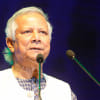Social Business: Experiences, ideas shared at conference
A two-day social business conference ended yesterday with indoor discussions where entrepreneurs, investors, practitioners and experts from various countries shared their experiences and ideas tied to the new business theory pioneered by Nobel peace laureate Prof Muhammad Yunus.
The informal meetings took place in the capital's Yunus Centre that promotes works and philosophies of the Bangladeshi economist.
At the country forum, participants from countries including Bangladesh, China, Malaysia, Japan, India, Australia, New Zealand and Thailand discussed the current state of social business in their nations, according to an official of Yunus Centre, the organiser.
And how social business will be in future marked the end of the discussions, as the two-day Social Business Day celebrations concluded, according to a statement issued by the centre.
“We have tried our best to give as much scope as possible to discuss social business. At least, they are not returning home empty-handed,” said Sabbir Ahmed Osmani, senior programme officer for the media at Yunus Centre.
The conference was cut short and organised under an alternative arrangement just before schedule when police conveyed its inability to provide security at the programme venue -- newly built Samajik Convention Centre in Zirabo, Savar.
This prompted Yunus Centre to cancel most of the programmes. Some sessions were organised on Facebook, which were participated by foreign guests who had already arrived.
Some panel discussions took place at Le Méridien hotel in the capital on Friday in presence of foreign delegates only. The theme was “Can wealth concentration be stopped?”
“Social business will be most successful in countries that are struggling to achieve the Sustainable Development Goals [SDGs],” said Thomas Gass, an assistant secretary general of the United Nations, at the opening ceremony on the day.
“Social business also helps set the moral standards required to achieve the goals,” he added.
At the beginning of the session, Lamiya Morshed, executive director of Yunus Centre, presented the welcome speech.
Prof Muhammad Yunus welcomed some 250 international participants representing more than 50 countries.
He said, “This is a gathering of social business practitioners, academics and enthusiasts -- what we call a family gathering. We wait the whole year for this day to come together and see each other and share our views.”
Thomas Gass said the new sustainable development agenda needed generous and visionary leaders who would be working through partnerships with other stakeholders to make the implementation of the SDGs as effective as possible.
“As social business you have long been blazing this trail.
“Let's work towards a society that is sensitive to the importance of reducing inequalities,” the senior UN official said.
Talking about the SDGs, he said, “The challenges before us are enormous, but so are the opportunities. The achievement of the SDGs will require the commitment of all.”
Joël Bouzou, president of the World Olympians Association, said many potential athletes were unable to practise sports because of scarcity of facilities, which can be resolved through social business.
“Everyone deserves equal chance to compete and to excel.”
A memorandum of understanding for setting up Yunus Social Business Centre (YSBC) was signed with seven renowned international universities at the event. The universities include the Autonomous University of Baja California, Mexico; Chandigarh University in India; Catholic University of Zimbabwe; University Putra Malaysia; Bethlehem University in Palestine, and the Chinese University of Hong Kong. With these, the total number of YSBCs around the world will be 41.
A video-based online social business course was also launched with an aim to reach a target of half a million subscribers and break the Guinness Book of World Record for the highest number of enrollment in an online course. The course is designed by a set of professional course creators led by Wajed Salam from the United States.
Videos were played at the event, with greetings from Jose Graziano da Silva, director-general of the Food and Agriculture Organisation; Erik Solheim, head of the United Nations Environment Programme; Salman Khan, founder of Khan Academy, a free online education platform; Mayor of Paris Anne Hidalgo; Christoph Heinrich, vice-chairman of the Conservation at the WWF Germany; Maria Teresa Mestre y Batista, Grand Duchess of Luxembourg; Scott Morrison, finance minister of Australia; and Paul Polman, CEO of Unilever Ltd.
In his concluding speech, Prof Yunus emphasised the importance of starting small and working consistently to realise the vision of achieving three zeroes: zero unemployment, zero poverty and zero net carbon emission.
“If I can make one village achieve zero unemployment, I would think myself successful. This small achievement will also make people believe in themselves. They will move on to achieve zero poverty and then zero net carbon emission. Gradually it will be two villages, then cities and one day the country will achieve the three zeroes.”
Some 200 international participants had arrived to participate in the conference.
Rodrigo Castañeda, chief of partnerships unit of the Food and Agriculture Organisation of the UN; Bei Duoguang, director of the China Academy for Financial Inclusion; Prof Anil K Gupta, executive vice chair of the Indian Institute of Management; Richard St-Pierre, president of C2 Montréal, Canada; Prof Jin-Huei Yeh, associate professor of the Department of Finance at the National Central University, Taiwan; Steve Hollingworth, president of the Grameen Foundation, USA; and Meng Zhao, associate professor at Renmin University of China, also spoke.
Other notable speakers were Hans Reitz, founder of Grameen Creative Lab, Germany; Anne W. Bunde-Birouste, founder of Yunus Social Business Health Hub at the School of Public Health and Community Medicine of University of New South Wales, Australia; Jacques Berger, managing director of action tank and social business at HEC Paris; Shankar Venkateswaran, chief of Tata Sustainability Group, India; Rogerio Oliveira, chief of partnerships unit of YSB Brazil, and Aarti Wig, country director of Yunus Social Business in India; and Faiz Shah, director of Asian Institute of Technology, Thailand.
The Social Business Day was introduced in Dhaka in 2010 to discuss, debate on and exchange ideas about the new business theory pioneered by Prof Yunus.
A meeting will be held today of the academics and faculty who attended the conference. It is expected that 120 faculty members from 30 universities will discuss theoretical aspects of social business there.
It was arranged for taking preparation for the Social Business Academia Conference scheduled for November in Paris.

 For all latest news, follow The Daily Star's Google News channel.
For all latest news, follow The Daily Star's Google News channel. 







Comments